The LZI - Metaverse
A digital world for learning together, supporting teaching, extracurricular activities and socialising in computer science studies.
Initial situation
The Computer Science Learning Centre (LZI) at UPB has been supporting you since 2012. You can meet like-minded people on its premises to work and learn together and it also tries to offer you a wide range of services to make it easier to start your studies and stay motivated until the end.
With the first lockdown, the doors suddenly had to remain closed and attempts were made to digitise the previous offers. All information about the LZI programme was quickly transferred from the usual posters to a new PANDA course. The consultation hours of your specialist tutors could be moved to online sessions, but the technology did not play along right away and the usual quality of the consultation hours could certainly not be achieved. However, the use case of spontaneously visiting the LZI to get in touch with fellow students who were also working on the exercise sheets or trying to explain the new topics of the courses to each other was devastating. In general, there was no longer any need to go to face-to-face locations to socialise with fellow students.
The return to the classroom also did not go quite as well as one might have imagined. Many had retreated to their home offices outside Paderborn and some had recognised the advantages of no longer having to travel to PB every day or live locally. Our lecturers have mostly retained their additional digital offerings so that it is still possible to study remotely as far as possible. However, face-to-face locations, such as the learning centre as a meeting point for joint work, remain inaccessible.
Project and objectives
Against this background, the development and testing of an LZI metaverse is planned. The aim of the project is to test the metaverse technology for use in learning scenarios and thus contribute to improving the quality of teaching. In addition to the face-to-face learning centre, the LZI-Metaverse is intended to provide a platform for making contact with like-minded people from any location and staying in touch with them around the clock. Just as in face-to-face learning locations, people can meet in groups to work together in similar settings to the face-to-face learning centre. In future, the Metaverse is to become a virtual meeting place for projects and tasks in a university context.
A feasibility study has identified the open source platform Vircadia as a promising candidate. Data protection is satisfied because this platform can be operated on a self-hosted server and can only be accessed on the university network (from home via a university VPN).
The planned Metaverse features
The virtual world must allow students to walk casually between other visitors and to be able to talk to everyone present without technical complications. There will be various meeting points that you can search for like-minded people or that you can name to your fellow students in order to arrange to meet there. It is important to be able to talk freely in closed groups and to have spaces that are accessible to everyone and encourage open dialogue.
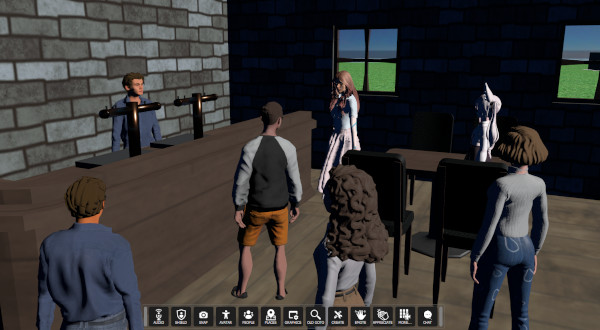
In addition to the pure meeting places, there should be many rooms in the virtual world where surfaces are available that can be used for screen sharing. Learning groups can come together there and work together on tasks and discuss their recordings. The audio chat and the shared screen enable the realisation of a variety of learning settings. The learning environment offered to students in a classroom can be recreated in many ways. This makes it possible to solve individual problems together in a digital setting.
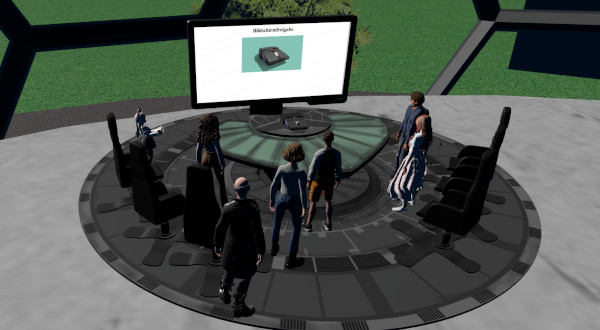
Students can meet in various cinemas, theatres etc. and watch the available online recordings of their courses. Technically, it is conceivable that the students could come together in shared locations, then watch their 'own' videos and simply come back later to talk. Or they can all watch the same recording synchronised in the virtual hall. In contrast to watching videos at home, the virtual cinema room offers the opportunity to discuss the specific subject matter and make in-depth material on the relevant topic permanently available. Previously held events can also be watched digitally in this setting with like-minded people.
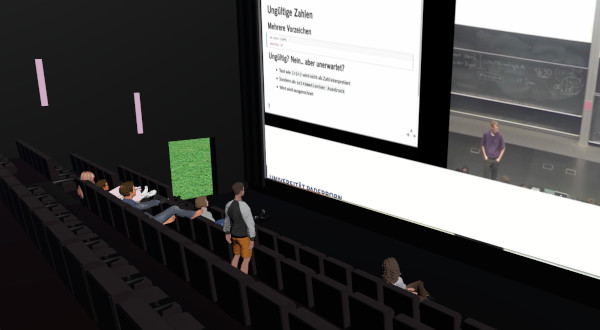
Virtual stages with the option of screen sharing can be used for courses in the Metaverse, for example. However, they also provide a framework for online events at the learning centre and for presentations by working groups from all departments. Learning groups could also use these stages for their joint work or students could try out their own presentations in front of fellow students.
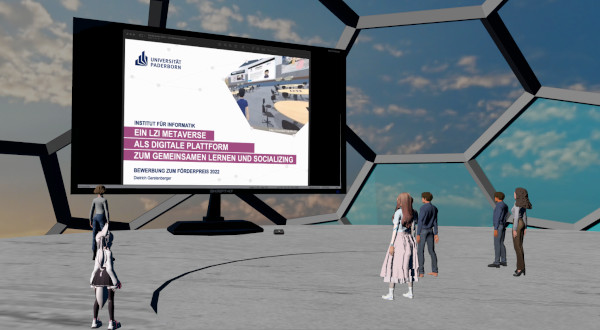
Information stands can be used, for example, to present the entire range of services offered by the learning centre. Here, the schedules of the current office hours are made available, the dates of the next LZI events are announced, but also all forms of announcements are visualised. Other departments, the Central Student Advisory Service or the International Office could set up information stands here or offer such services in their own metaverses.
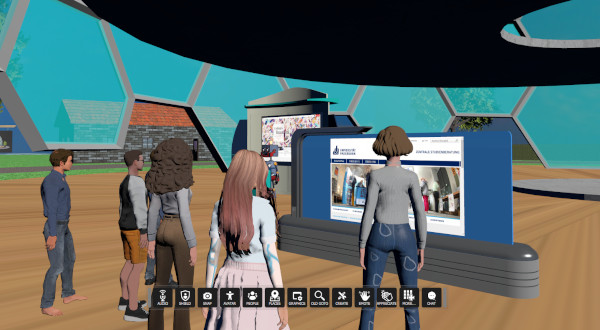
The virtual worlds can theoretically offer countless meeting points. In addition to the learning centre, the student council, the various working groups or the Central Student Advisory Service (ZSB) could also set up their own contact points. Via links within the individual metaverse instances, users can intuitively switch from the LZI's offer to other metaverse instances (e.g. by passing through a door). Individual contacts in the university context are thus easily connected and can be reached quickly.
Transferability to other degree programmes and fields
The platform available at the end of the project offers easy transferability to the needs of learning centres in neighbouring departments such as Electrical Engineering, Mechanical Engineering, Chemistry and Physics. Furthermore, cooperation with the student councils and student advisory services of the departments already mentioned, but also with the overarching service centres, such as the Central Student Advisory Service and the International Office, can be implemented.
Bachelor's or Master's theses in the context of the Metaverse
A few concepts and development tasks are already on the wish list at the moment, and more will certainly be added. Here is the current selection that could be completed as part of a Bachelor's or Master's thesis, for example:
In a metaverse, it should be possible to support the collaborative work of user groups with the integrated browser. Since each user has their own browser session, the actions of all users who work together with a collaborative application (e.g. on a shared whiteboard, on a mind map, etc.) must be managed on a server. The browsers of the various users can then use this data to build the shared page content and create the impression that they are working on a shared artefact. We deliberately avoid using collaborative tools from third-party manufacturers in order to be able to keep all data on our own server.
Use case:
Several users work collaboratively in their browsers, e.g. on a shared whiteboard
Scope of the work:
- Conception of a framework for the development of collaborative web applications.
- Implementation of the framework.
- Provision of a test framework for the acceptance of the framework.
In a metaverse, it should be possible to select and watch films from a range of predefined sources. A browser integrated into the metaverse is available for this purpose, which will offer the possible films in an intuitive UI in the future. The film selection will essentially consist of digitised courses, which are typically provided by our lecturers
on youtube or in the in-house video portal.
The concept will probably have to provide for an additional admin UI, as the original titles of the media
may have to be mapped to more comprehensible names. Furthermore, it may be necessary to store some of the video sources
in a converted version on the Metaverse server because the original media cannot be viewed in the open source Metaverse browser (-> Codecs).
